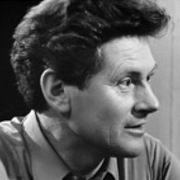
Harry Lavington
The eldest of five, Harry Lavington grew up in hometown Cardiff, the Welsh capital. His father volunteered to go to France at the start of World War 2. Harry joined up in the war's final stages, having got into the navy before he turned 18, thanks to time spent in the sea cadets.
Trained as a radar operator, he spent just over two years at sea, helping on minesweeping operations, and stopping Jewish immigrants trying to reach Haifa, in the lead up to the city becoming part of the new state of Israel.
The New Zealanders Lavington had met during time in the Navy impressed him with "their free thinking and lack of respect for authority". After time as a policeman back in Cardiff, Lavington and his first wife headed downunder on an assisted immigration scheme, joining his brother-in-law in the Hutt Valley. The deal saw Lavington tied for two years to a job with the New Zealand police.
After scoring free tickets to a local amateur play, Lavington told his wife that the character of the English lord sounded more like a Kiwi plumber. She replied: "can you do better?" Lavington's stage experience at this point extended to rugby singalongs and seeing the odd pantomime. In 1956 he made his acting debut, after Davina Whitehouse cast him as a policeman in Toad of Toad Hall. Two years later Richard Campion singled Lavington out for special praise, for his role as an Italian immigrant in Arthur Miller's A View from the Bridge. The NZ Drama Council named him actor of the year.
Campion invited him to audition to join The New Zealand Players, the only professional company at the time. Lavington won acclaim for a number of his roles with the troupe. One of Palmerston North's daily newspapers described his work in JM Barrie comedy What Every Woman Knows as "flawless". After six plays — three as romantic lead — Lavington was leading a quartet of actors on a tour of schools when he learnt that the main company had folded. The same year (1960) he was asked to play Jesus Christ, in the first of a trio of outdoor performances of passion play The Crucifixion.
Lavington owes his screen career to Wellington company Pacific Films. Pacific boss John O'Shea first cast him in Think about Tomorrow, as a goldminer. The short film celebrated the 1961 centennial of Hokitika. He went on to do weekend work on O'Shea's second and third features: Runaway (as a gas station attendant) and Don't Let it Get You (playing a drummer). He was also appearing in commercials for Pacific — including as the moustached Laughing Cavalier who doesn't feel alive, until he gets a cup of Bell tea. On stage, he did 13 plays for Downstage Theatre, including the debut seasons of Robert Lord's Well Hung and Bruce Mason's Awatea, which packed out the Wellington Town Hall.
The 70s saw roles in adventure romp Rangi's Catch and TV series Buck House (as a university lecturer) — plus an ongoing part as the local policeman, in pioneering Kiwi drama Pukemanu. He also starred in theatre legend Nola Millar's last play as director: as a man running a sheep station, in 1973's A Southerly Wind.
The role that won Lavington ongoing recognition was in Close to Home. New Zealand's first soap debuted in May 1975; Lavington joined the cast as baker and family man Ken Paget in the show's third week on air. His two week contract grew to three months, and finally seven years. Off-screen, Lavington did 14 years as a Wellington health inspector, but Close to Home soon enabled him to live off acting alone. He realised how much the show meant to people, after the cast got a standing ovation while visiting a Petone senior citizens' club. "They were so excited and made such a fuss."
In 1976 the Close to Home team learnt that Lavington was planning a trip back to Wales. And so he found himself back in Cardiff, acting scenes as Ken Paget in the actual house where he had grown up, as his parents watched.
Lavington's screen wife Dot was played by Glenis Levestam, who he had once proposed to in NZ Players touring production The Tree. The two actors successfully persuaded scriptwriters that the idea of Dot having an affair was not worth pursuing; to Lavington's horror, the plotline was given to his character instead. Close to Home's cast also included Charles Walker; back in the 50s when the NZ Players toured, the two had slept rough, to save money.
Lavington's final stage role was in 1983 Roger Hall hit Hot Water. On screen, he had a small part in 1991's acclaimed An Angel at My Table, borrowing director Jane Campion's glasses to play a psychologist. Jane is daughter of the late Richard Campion, who gave Lavington one of his earliest acting breaks with the NZ Players.
Sources include
Harry Lavington
Marilyn Davies
Carey Clements, 'Harry back in the spotlight' (Interview) - The Wellingtonian, 23 April 2015
Karen Jackman, 'The Workaday World of 'Close To Home' - The Listener, 20 May 1978, page 14
John Smythe, Downstage Upfront - the first 40 years of new zealand’s longest-running professional theatre (Wellington: Victoria University Press, 2004)
Writer unknown, 'Harry's home to TV spot' - South Wales Echo, 9 September 1976